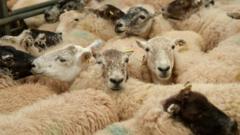Will Travel Restrictions Ease for the Deadly Livestock Virus?

Understanding the Eased Bluetongue Virus Restrictions in Wales
The recent easing of bluetongue virus restrictions in Wales marks a significant turning point for the agricultural sector in the region. With the Welsh government allowing vaccinated livestock to cross the border into England, farmers are optimistic about revitalizing trade and improving market access. This change comes after months of stringent regulations aimed at preventing the spread of bluetongue virus (BTV), a disease that poses serious risks to livestock, specifically cattle, sheep, and goats.
As a farmer's lifeline, it's essential to grasp the implications of these adjustments, especially for those engaged in livestock trading. The easing of restrictions is not just about permitting movement; it encompasses a broader strategy of disease management and economic resilience. This article delves into the details of these changes, the impact on farmers, and the ongoing importance of vaccinations in safeguarding livestock health.
The Bluetongue Virus: An Overview
Bluetongue is a viral disease primarily transmitted by biting midges. Its effect on livestock can be severe, resulting in symptoms such as fever, swelling, and even death. While the virus is not a threat to food safety or human health, its impact on animal welfare and farm productivity is undeniable. As it stands, there have been no reported cases in Wales this year, but the vigilance surrounding the disease remains high, especially with cases reported in England.
What Are the New Restrictions?
Starting Monday, livestock that have completed a bluetongue vaccination course (specifically BTV-3) can be transported to markets within a 12-mile (20 km) radius of the Welsh border. This decision, communicated by Wales' chief vet Richard Irvine, aims to balance the need for livestock movement with the imperative of public health and animal safety.
However, it is essential to note that the movement of unvaccinated animals and livestock from England into Wales will still face stringent restrictions unless accompanied by a negative test. Farmers are required to ensure that their livestock are vaccinated before attempting to cross the border, reflecting a continued commitment to disease prevention.
Economic Impact on Farmers
For farmers like Ryan Thomas from Machynlleth, Powys, the restrictions had significant economic consequences. Since the enforcement of these regulations in July, livestock prices surged as Welsh farmers were compelled to buy stock locally, leading to increased operational costs. Ryan's experience underscores the broader economic strain on the farming community, which relies heavily on cross-border trade for livestock procurement.
The Welsh government’s decision to ease restrictions is seen as a lifeline for many farmers who have been grappling with inflated prices. By allowing vaccinated livestock to be sold in English markets, farmers can not only access a broader range of livestock but also potentially stabilize market prices.
Market Conditions and Compliance
Markets in England will be required to hold dedicated sales for vaccinated Welsh livestock, along with adhering to strict guidelines to mitigate the risk of disease transmission. These conditions are crucial in ensuring that trade can resume without compromising animal health. Some of the designated markets include Bishops Castle, Hereford, Kington, Ludlow, Market Drayton, Oswestry, Ross-on-Wye, and Shrewsbury, all of which are now set to play a pivotal role in facilitating cross-border livestock trade.
Vaccination Status and Ongoing Efforts
Despite the positive changes, the vaccination rates among livestock remain alarmingly low. According to Helen Roberts of the National Sheep Association in Wales, only 43,000 sheep have been vaccinated. This statistic emphasizes the need for continued awareness and action among farmers, especially with the busy autumn season approaching, typically associated with increased exposure risks to BTV.
The Welsh government encourages farmers to prioritize vaccination to protect their livestock effectively. Vaccination remains the most effective means of safeguarding animals from the bluetongue virus. It is not only a health precaution but also a vital aspect of trade readiness as market conditions evolve.
Looking Ahead: Future Changes and Considerations
Chief vet Richard Irvine has indicated that further changes to bluetongue policy may be on the horizon. These potential adjustments may include easing conditions for the sale of breeding stock at "bluetongue-approved markets" in Wales. Such markets could facilitate the sale of BTV-3 vaccinated livestock from both England and Wales, provided that they meet the necessary health standards.
This proactive approach aims to balance the needs of the livestock industry with the critical task of preventing disease spread. As more markets apply for "bluetongue-approved" status, farmers will have greater opportunities to engage in safe trade practices.
Conclusion: A Balancing Act for Farmers
The easing of bluetongue virus restrictions in Wales is a significant development for farmers, who have faced financial challenges due to previous limitations. By allowing vaccinated livestock to move across the border, the Welsh government is taking a step toward revitalizing trade while maintaining essential health precautions. However, the low vaccination rates among livestock underscore the importance of ongoing education and action within the farming community.
As the agricultural landscape continues to evolve, farmers must stay informed about the latest regulations and vaccination protocols to protect their livestock and livelihood. The balance between trade and health remains delicate, but with collaborative efforts, the farming industry can adapt and thrive in the face of challenges.
FAQs About Bluetongue Virus Restrictions in Wales
What is the bluetongue virus, and how does it affect livestock?
The bluetongue virus is a disease transmitted by midges that affects cattle, sheep, and goats. It can cause severe health issues in livestock, including fever and swelling, and can be fatal in some cases.
What are the new restrictions regarding livestock movement in Wales?
Vaccinated livestock can now be transported across the border into England, provided they have completed a BTV-3 vaccination course. However, unvaccinated animals and livestock from England entering Wales still face restrictions unless they have a negative test.
How are farmers reacting to the easing of restrictions?
Many farmers view the easing of restrictions positively as it allows them to access broader markets. However, concerns remain about the low vaccination rates and the potential economic effects of disease spread.
What are the implications of low vaccination rates among livestock?
Low vaccination rates pose a risk for both animal health and trade. Without adequate vaccination, livestock are more susceptible to bluetongue virus outbreaks, which can lead to increased restrictions and economic losses for farmers.
The agricultural community must remain vigilant and responsive as these changes unfold. As farmers, are you prepared to adapt your practices to meet the new regulations and protect your livestock? #BluetongueVirus #LivestockTrade #FarmingCommunity
Published: 2025-08-17 21:00:47 | Category: wales



